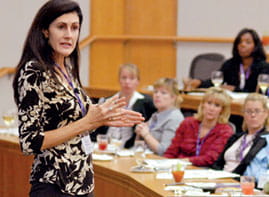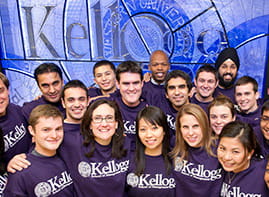7/28/2014 -
Editor's note: In the Start Me Up series, the Kellogg School spotlights younger members of the Kellogg community who are bringing bold entrepreneurial visions to life.
The cliché is true, says Chris Motley ’11: Companies tend to hire on skills and fire on fit.
Problem is, during the hiring process, fit is hard to determine and harder to quantify. Fitting in at a company is one of the reasons so many people are unhappy at work, Motley says, citing a Gallup poll that reported two-thirds of employees are not engaged with their jobs.
“Think about the millions of dollars lost that translates to,” he says.
Better Weekdays hopes to change that dynamic. Founded by Motley in 2012, the career-management platform uses big data and analytics to match job-seeking professionals with candidate-seeking companies, based on compatibility and cultural fit.
Launching in beta last summer, the platform uses an engine called MatchRank to determine job seekers’ personalities and competencies using data from their résumés, employment preferences and JobScript. A self-assessment tool similar to the Myers-Briggs test, JobScript analyzes an individual’s personality (motivations and values) and makes job recommendations based on that information.
At the same time, the technology scrapes the web for job postings, attaches metadata to the postings and then filters them to candidates according to compatibility. To date, the website maintains approximately more than 300,000 job postings.
The tech solution
The idea for Better Weekdays started percolating in 2006, when Motley decided to move on from his job as a trader for Goldman Sachs, but wasn’t sure what to do next.
Through a chance experience, Motley landed an executive role job within the textile industry in Chicago. “But I wondered, why did I have to rely on serendipity to have this great opportunity?” he says. “Could you leverage technology to find a fulfilling job?”
After raising $100K from friends and family and joining tech incubator 1871, Motley quit his job in June 2012 to focus on Better Weekdays. He also teamed up with Joe Dwyer ’08, a lecturer at Kellogg and partner at Digital Intent, to help build out the site’s platform.
Linda Darragh, executive director of the
Kellogg Innovation and Entrepreneurship Initiative (KIEI), invited Motley to co-host an entrepreneurship panel at 1871 with the founders and CEOs from GrubHub, KCura and Signal (formerly BrightTag). She also connected him with alumni and local business leaders.
“What I learned from Kellogg, and what I think is so true to today in entrepreneurship, is to have a culture of collaboration and align interests accordingly,” says Motley. He adds that his education gave him practical tools and frameworks for launching a startup, teaching him how to assess business opportunities, manage cash-flow challenges and drive growth by focusing on core competencies.
“The Kellogg education was the formal foundation of my entrepreneurial journey,” Motley says.
Targeting talent
Better Weekdays is open to job seekers at any professional level, but its services are aimed at Millennials or Gen-Y talent (born between 1978 and 1997), the fastest-growing worker demographic in the United States.
Millennials, in particular, offer an attractive market opportunity. “They can have three or four jobs in the first 10 years of their career, which is very different from 30 years ago,” says Motley. “That’s 60 to 80 million job transitions. And we want to be the platform that helps facilitate that in a very personal, private way.”
On the company side, Better Weekdays is most interested in promoting middle-market companies. These companies, Motley explains, create a lot of jobs — an estimated 1 million in 2014 — yet lack the brand visibility and awareness to attract relevant talent.
Making connections
Better Weekdays also partners with universities through career fairs, inviting companies to post jobs to their site while allowing students to upload their résumés and complete a job assessment. The system then matches students with companies prior to the fair.
As a result, “job seekers don’t have a lot of trepidation in terms of figuring out what companies to visit first; they have a short list,” says Motley. “And companies come away with a list of candidates that they may or may not have had the chance to see.”
Currently, Better Weekdays works with about 200 universities, schools and academic organizations across the country, including Kellogg, Harvard University and Delta Sigma Phi, the largest business fraternity in the United States.
Motley’s goal is simple: “To create career happiness by making meaningful connections between job seekers and employers,” he says. “If we remove the junk that’s creating all this friction, then we get the right people in the right jobs. People are more productive, they’re retained longer and everyone is more successful.”
Read more in the Start Me Up series:






